Brake fluid is a vital component of your vehicle’s braking system, and any leakage can compromise the effectiveness of your brakes. In this post, we will explore the various reasons why brake fluid leaks from the rear wheel and what you can do to fix the issue.
We will also discuss the importance of regularly checking your brake fluid levels and the potential consequences of ignoring a brake fluid leak. Stay tuned for more information on this important topic.
There are several possible reasons why brake fluid may leak from your vehicle’s rear wheel. Some common causes include:
Worn or damaged brake hoses: The brake hoses carry brake fluid from the master cylinder to the brake calipers. If these hoses are damaged or worn, they may develop leaks, causing brake fluid to leak from the rear wheel.
Faulty brake caliper: The brake caliper is responsible for applying pressure to the brake pads, which stops the vehicle. If the brake caliper is damaged or faulty, it may leak brake fluid.
Loose or damaged brake line fittings: The brake lines carry brake fluid from the master cylinder to the brake calipers. If the fittings on these lines are loose or damaged, they may cause a leak.
Worn or damaged brake pads: If the brake pads are worn down or damaged, they may create a gap between the pad and the brake rotor, allowing brake fluid to leak out.
It is important to address a brake fluid leak as soon as possible, as a lack of brake fluid can compromise the effectiveness of your brakes and put you and others at risk. If you suspect a brake fluid leak, it is best to have it inspected by a professional mechanic.
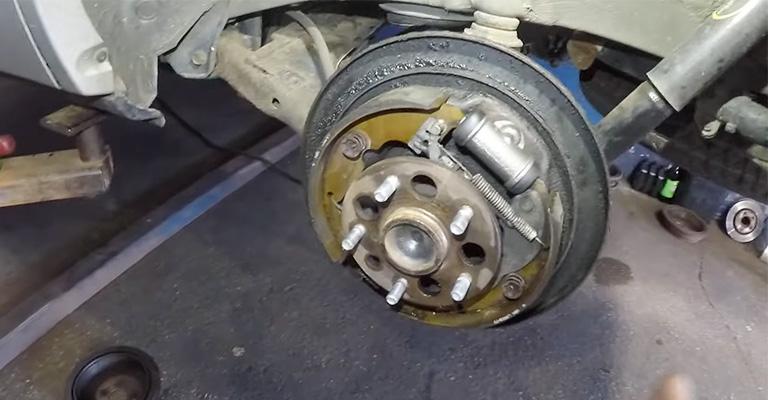
Contents
Understanding Why Brake Fluid Leaks
Vehicle brake systems are designed to operate as closed systems. Besides brake pedals, switches, reservoirs, brake lines, cylinders, links, pistons, and brake fluid, it also consists of brake fluid and brake fluid reservoirs.
Pumps, brake lines, and master cylinders are stationary, whereas switches and pistons are constantly moving. When any of these components is damaged, brake fluid leaks can affect your vehicle’s braking performance.
It is crucial to ensure your brake system is in good working order to ensure your vehicle is safe and reliable. It is anything but natural for your brake fluid to leak, and some other problem in the braking system usually causes it.
The only possible exception is if you recently had your brake system serviced and the brake fluid reservoir is low; this just means that the fluid has settled throughout the system and needed a bit more to fill the reservoir.
Essential Fluid
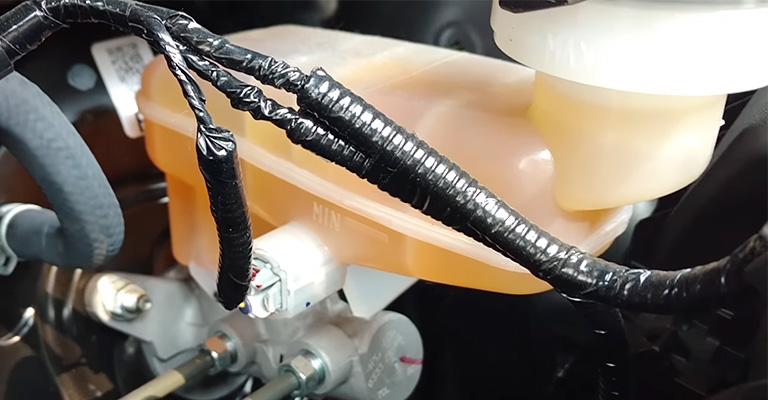
It is essential for your vehicle’s safe operation that brake fluid is designed to transfer the force and movements created when you press the brake pedal. It can be impossible to stop a vehicle with a brake fluid leak because the brake pressure is lost.
Why Is My Brake Fluid Leaking From My Back Tire?
The trail your vehicle leaves when it leaks brake fluid can range from yellowish to a dark brown color, similar to motor oil. The ground under your vehicle, around the master cylinder, brake lines, rotors, and drums are some places to check if your vehicle is leaking.
In slow leaks, dirt can accumulate, so wipe the dirt away and inspect the area if you see dirt caking. When pads or shoes wear, and their counterpart rotors and drums become worn, the pistons that operate those parts can become hyperextended, causing the cylinder seals to break and fluid to leak.
Having a soft brake pedal or one that suddenly performs differently may indicate a major leak. Taking appropriate measures of inspection or contacting a professional should be your first course of action under these conditions.
You should check the reservoir, which is normally located near the master cylinder, to ensure sufficient fluid in it.
Considering the severity of brake failure that can result from a brake leak, this is not something to take lightly and requires immediate attention for both your safety and the safety of others. A vehicle may leak brake fluid for several reasons:
Bad Wheel Cylinder
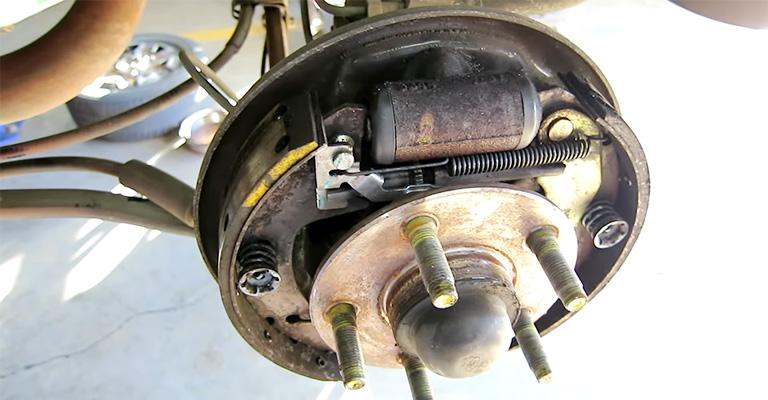
When you see brake fluid on the wall of a tire, you probably have a bad drum brake wheel cylinder. In addition to pulling to one side, your car may pull to one side due to uneven fluid pressure from a brake leak from a wheel cylinder.
Faulty Master Cylinder
It is most likely that the master cylinder is the culprit if brake fluid accumulates underneath the rear of the engine, but it may also be a slave cylinder problem. There is a tendency for brake fluid to pool near the wheels when there is another brake leak issue.
Loose Bleeder Valves
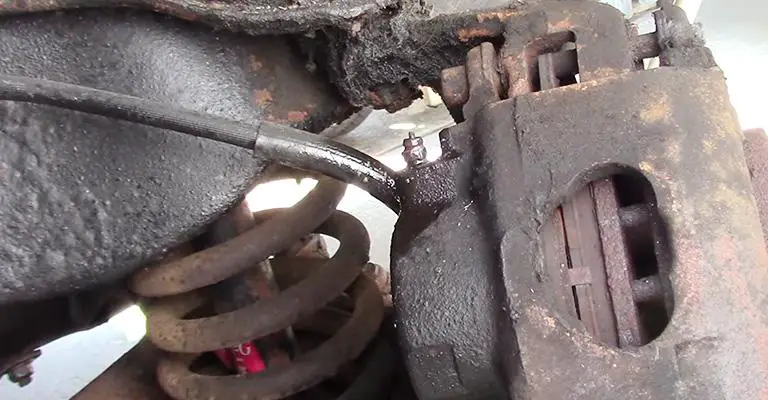
In addition to their other names, bleeder bolts are found on brake calipers and serve to remove excess fluid when servicing the brake system. It is possible that one of the valves was not properly tightened if you had a brake fluid flush or other work recently.
Damaged Brake Lines Or Fitting
The issue is quite serious, even though it can be fixed inexpensively, but if not addressed quickly, it can be life-threatening. After pumping the brake pedal several times to attempt to build up pressure, you will know there is a hole in one of the lines or a failed fitting if the brake pedal gives little to no resistance.
Common Symptoms Of A Brake Fluid Leak
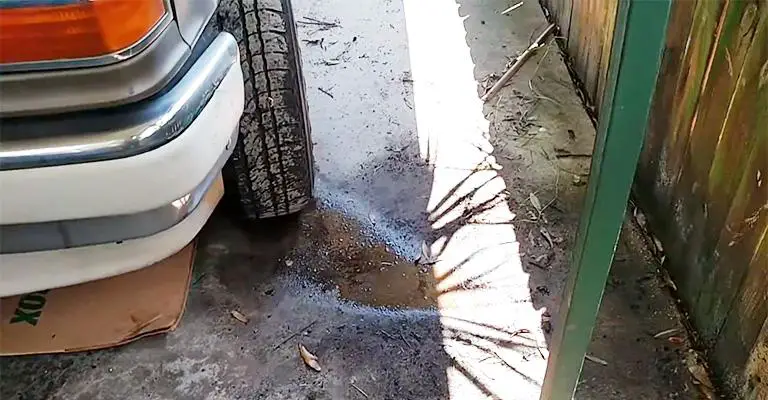
It is possible to spot a brake fluid leak by looking for certain red flags. If your vehicle’s brake performance is compromised, there’s likely an issue in the braking system.
If brake fluid leakage or worn brake pads, you just have to determine what is causing the issue. The following signs are typically associated with a brake fluid leak:
1. There’s A Puddle of Fluid Under Your Car
There is no better indicator of a brake fluid leak than this. There are, however, times when a puddle of fluid does not necessarily indicate a brake fluid leak under your car.
You should remember that your vehicle utilizes a variety of fluids to function properly. Don’t get panicked if you see a puddle under your car. The cause could be anything. Occasionally, condensation from your air conditioner causes it, especially if you’ve had it running for a long time.
Having a good look at the fluid is the best course of action. Just as it is important to note the color of the puddle, it is also important to note the location. You can tell which component of your brake system is causing problems by the location of a puddle if your vehicle leaks brake fluid.
2. The Brake Pedal Drops To the Floor
When you step on the brake pedal, it sinks to the vehicle floor. This could indicate a serious problem. Take a break from driving if this happens before you leave on your trip.
There is a very high chance of a massive leak or a problem with the master cylinder if this occurs. In such cases, the brake fluid level is likely too low for the brakes to function efficiently.
Using gear braking is your best option if you experience brake issues like this while driving. When the engine is running, downshift to slow the car, and find a safe, stop as quickly as possible.
Using the parking brake gently will allow you to stop when you’re moving slowly enough. It’s not a good idea to apply the parking brake while driving at speed, as it can send you tumbling.
3. A Mushy Feeling When The Brake Pedal Is Pressed
How does your brake pedal feel now that it is less resistant than before? Does it feel squishy or mushy?
It usually happens because of a problem with the master cylinder, brake booster, or low brake fluid in the reservoir. It may also result from air in the brake line caused by a leak that causes the brake pedal to feel soft.
If you wish to build hydraulic pressure on your brakes, you can pump them several times. You most likely have a leak if the pressure doesn’t build up.
4. The Brake Warning Light Flashes
Your brakes require repair if you have this problem. There are several possible causes of a brake warning light to glow, including:
- A low level of brake fluid in the master cylinder of the brake system
- This car has its parking brake activated (emergency brake)
- It seems that there is an issue with the ABS module in your anti-lock braking system
- The parking brake sensor or brake master cylinder may be defective
You should always take your car to a mechanic if your brake warning light flashes due to various possible causes.
Where To Check For A Brake Fluid Leak?
The brake fluid reservoir will have very low levels of brake fluid if there is a severe leak. The owner’s manual can help you find the brake fluid reservoir if you’re having trouble finding it.
Even if you’ve checked your brake fluid level and it’s fine, there’s still a possibility you’ve got a small leak somewhere that’s letting air in, increasing brake fluid loss.
What do you do when you find a small leak like this? There are four typical sections in an automotive brake system:
- The master cylinder
- Brake lines
There are two brake calipers on the front of the car and one on the rear. Checking these sections for leaks is possible, but you should always leave the job to professionals. How come?
To detect brake fluid leaks, many factors must be considered – some of which are unfamiliar to the average car owner. A professional mechanic is well-versed in brake inspection and has the necessary tools to address such problems.
Final Words
An automobile’s braking system circulates brake fluid, which creates pressure against the wheels when it is time to slow down or stop.
You should seek assistance as soon as your car or truck leaks brake fluid or if the levels are low. When your brakes are compromised, don’t risk your or your passengers’ safety.
